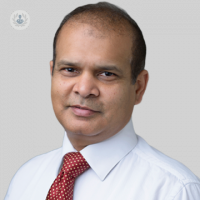Fibroids: Causes, diagnosis and treatment
Written by:Fibroids are a common condition that can have a number of different symptoms. In his latest online article, renowned consultant obstetrician and gynaecologist Mr Sourav Das answers your most frequently asked questions about this condition.

What can cause fibroids?
Fibroids are non-cancerous growths that develop in or around the womb (uterus). They are very common. They are made up of muscle and fibrous tissue and vary in size. The exact cause of fibroid is unknown, but they have been linked to the hormone oestrogen. Oestrogen is the female reproductive hormone produced by the ovaries. Fibroids usually develop during a woman’s reproductive years (from around the age of 16 to 50) when oestrogen levels are at their highest.
What are the symptoms of fibroids?
The symptoms of fibroids may vary depending on the size, number, and location of the fibroids. Approximately 40-80% of women have fibroids. However, many do not experience any symptoms from their fibroids, so they don’t realise they have fibroids. Some of the common symptoms of fibroids include:
- Heavy or excessive menstrual bleeding
- Prolonged menstrual periods—seven days or more of bleeding
- Pain during sex
- Pelvic pain or pressure
- Enlarged uterus
- Weight gain
- Infertility
- Frequent urination
- Difficulty emptying your bladder
- Constipation
- Backache or leg pain
Heavy bleeding and prolonged periods can also lead to anaemia, which can cause fatigue, weakness and dizziness. Sometimes, fibroids can cause acute pain if they outgrow their blood supply or interfere with other organs.

How are fibroids diagnosed?
Fibroids are usually diagnosed by a combination of physical examination and imaging tests. Some of the common tests used to diagnose fibroids are:
- Pelvic examination
- Ultrasound scan
- Hysteroscopy
- Laparoscopy
- Magnetic resonance imaging (MRI)
- Computed tomography (CT)
- Hysterosalpingography
How are fibroids treated?
The treatment of fibroids depends on the size, number, location and symptoms of the fibroids. Some women may not need any treatment if they have no symptoms or only mild symptoms. Fibroids often shrink after menopause, when the oestrogen levels decrease.
Some of the common treatments for fibroids are:
- Medicine for symptoms: These include medicines that can reduce heavy periods, such as the levonorgestrel intrauterine system (LNG-IUS), tranexamic acid, non-steroidal anti-inflammatory drugs (NSAIDs), and the contraceptive pill. These medicines do not shrink the fibroids. They may have side effects such as irregular bleeding, acne, headaches, breast tenderness, nausea, indigestion and diarrhoea.
- Medicine to shrink fibroids: These include medicines that can lower oestrogen and progesterone levels, such as gonadotropin-releasing hormone (GnRH) agonists and selective progesterone receptor modulators (SPRMs). These medicines can shrink the fibroids and improve the symptoms, but they may also cause menopausal symptoms such as hot flashes, vaginal dryness and bone loss. They are usually used for a short time before surgery or to manage symptoms until menopause.
- Surgery: These include procedures that can remove or destroy the fibroids, such as myomectomy, hysterectomy, uterine artery embolization, radiofrequency ablation, laparoscopic or robotic myomectomy, hysteroscopic myomectomy and endometrial ablation. The type of surgery depends on the size, number and location of the fibroids, as well as the woman’s age, fertility and preference. Surgery may have risks such as bleeding, infection, damage to other organs and recurrence of fibroids.
Mr Sourav Das is a renowned consultant obstetrician and gynaecologist based in London. If you would like to book a consultation with Mr Das, you can do so today via his Top Doctors profile


